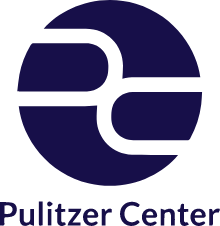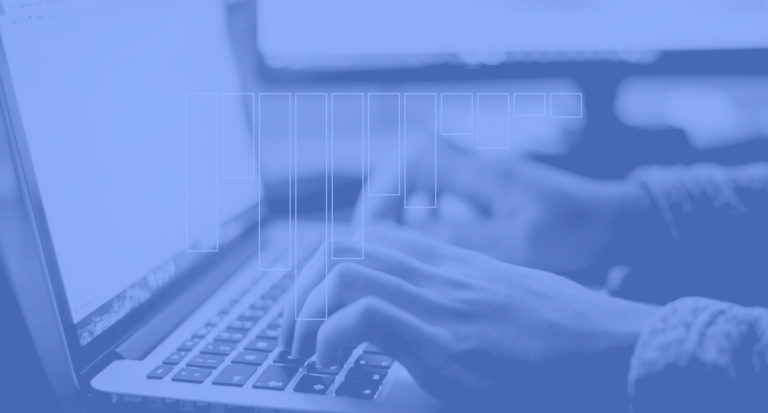
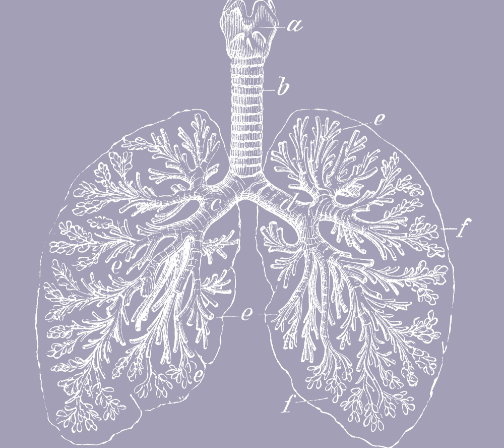

Subscribe
Data delivered to your inbox. Keep up with the latest developments.Forged statement about Gates Foundation vaccine investments shows rapid spread of misinfo.

Tech billionaire and philanthropist Bill Gates reached the third spot on South Africa’s Twitter trends on March 31, with over 35,000 tweets mentioning his name. An overwhelming number of the accounts that tweeted his name claimed Africa should not accept a vaccination for COVID-19 from Bill Gates, even though no vaccination is currently available. Tracing the content of the tweets revealed a fake message claiming to be from a French doctor that hopped from Facebook to Twitter, making its way from France to the U.S. to South Africa.
Gates has been the target of multiple conspiracy theories about the spread of the new coronavirus. One of the first theories, started by QAnon supporter Jordan Sather, claimed the Bill and Melinda Gates Foundation gave funding to an institute that patented a coronavirus vaccination, thus somehow implying Gates started the virus so he could sell vaccinations. The theory was debunked after it was proven the funding in question had gone to avian coronavirus research, not COVID-19. Nonetheless, its online spread demonstrates how disinformation can quickly travel across languages, countries and internet platforms.
The conspiracy theory
On March 27, 2020, a Facebook post written in French warned Africans not to take a vaccination created by Bill Gates. The warning was attributed to a French doctor named Didier Raoult, who according to the post, claimed that the vaccination was created by the West to destroy Africa. Raoult, a French physician and microbiologist specializing in infectious diseases, made a name for himself after claiming that the anti-malarial drug chloroquine was a cure for COVID-19 — an idea repeatedly endorsed by U.S. President Donald Trump. Raoult’s drug trials have been criticized by the scientific community, yet he has significant support around the world: a Facebook groups entitled “Didier Raoult Vs Coronavirus” has nearly 400,000 members, with many saying the doctor deserves a Nobel Prize.
The content of the message allegedly written by Raoult was haphazard and riddled with spelling errors. According to this narrative, Raoult appeared to question why Bill Gates would want to start vaccinating the African population against the novel coronavirus rather than starting in countries such as Italy, Spain and France, all countries with significantly higher infection rates. “I call on Africans not to take the vaccine that will soon be sold against the Corona virus, this vaccine contains poison and the West wants to destroy Africa,” an English-translated version of it quoted Raoult as saying.
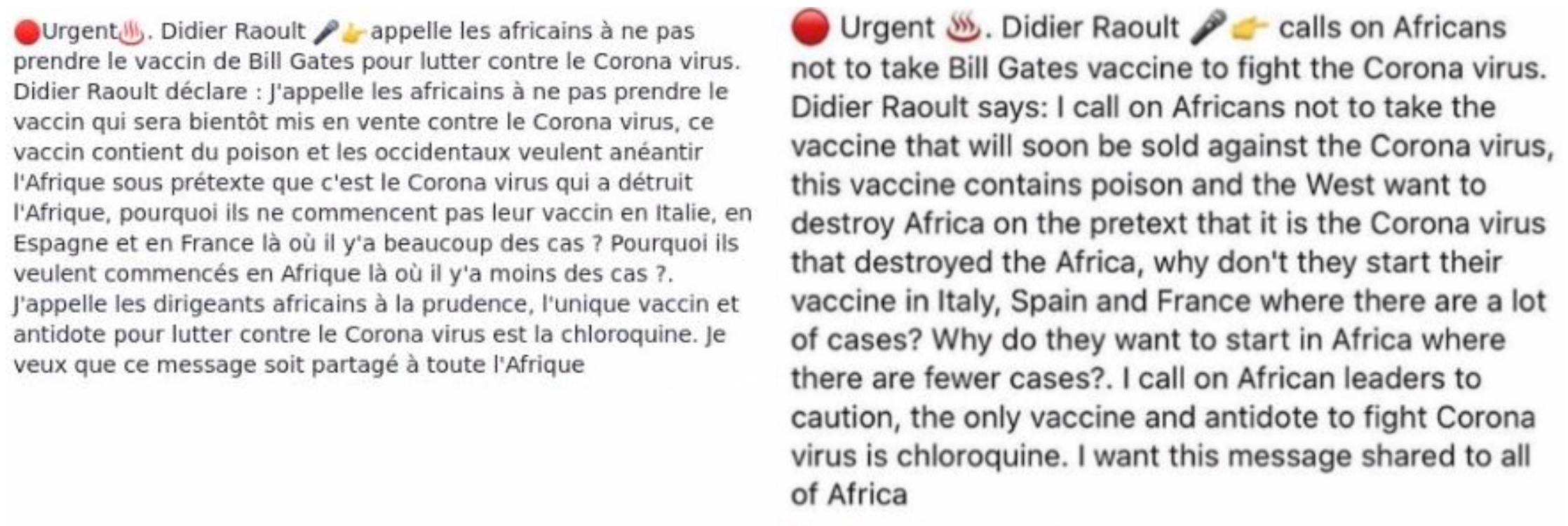
The lie goes viral
The message garnered significant attention in French-speaking groups and pages on Facebook, with one now-deleted post garnering over 47,000 shares. Posts that were not shared directly had identical content, with the image and text simply copied, pasted, and published over and over again.

The urgent call to action seemingly by a controversial French doctor was subsequently picked up by fringe new websites in multiple countries, in both French and English. A website called EN24.news, which allegedly operates as a translation service at a street address that does not exist, published what appears to be a direct Google-translated copy of the French text in English on March 28. That same day a website operating out of Guinea published the story in French, while a Ghanaian website picked up on the story on March 31 and published an English version.
On March 29, a Twitter account for Cynthia McKinney, an American politician who served six terms in the U.S. House of Representatives, tweeted the EN24.news cover of the story.

After moving from France to the U.S., the story was eventually picked up by South African social media accounts. Notably, an anonymous Twitter account that goes by the name Izwe Lethu (meaning “our land” in isiZulu) retweeted McKinney’s tweet on March 31. The account had nearly 66,000 followers at the time.
Izwe Lethu retweeted McKinney at 08:49 SAST, after which “Bill Gates” started to gain serious traction in South Africa. By mid-day local time, over 36,400 tweets mentioning Bill Gates had been posted by South Africa Twitter accounts.
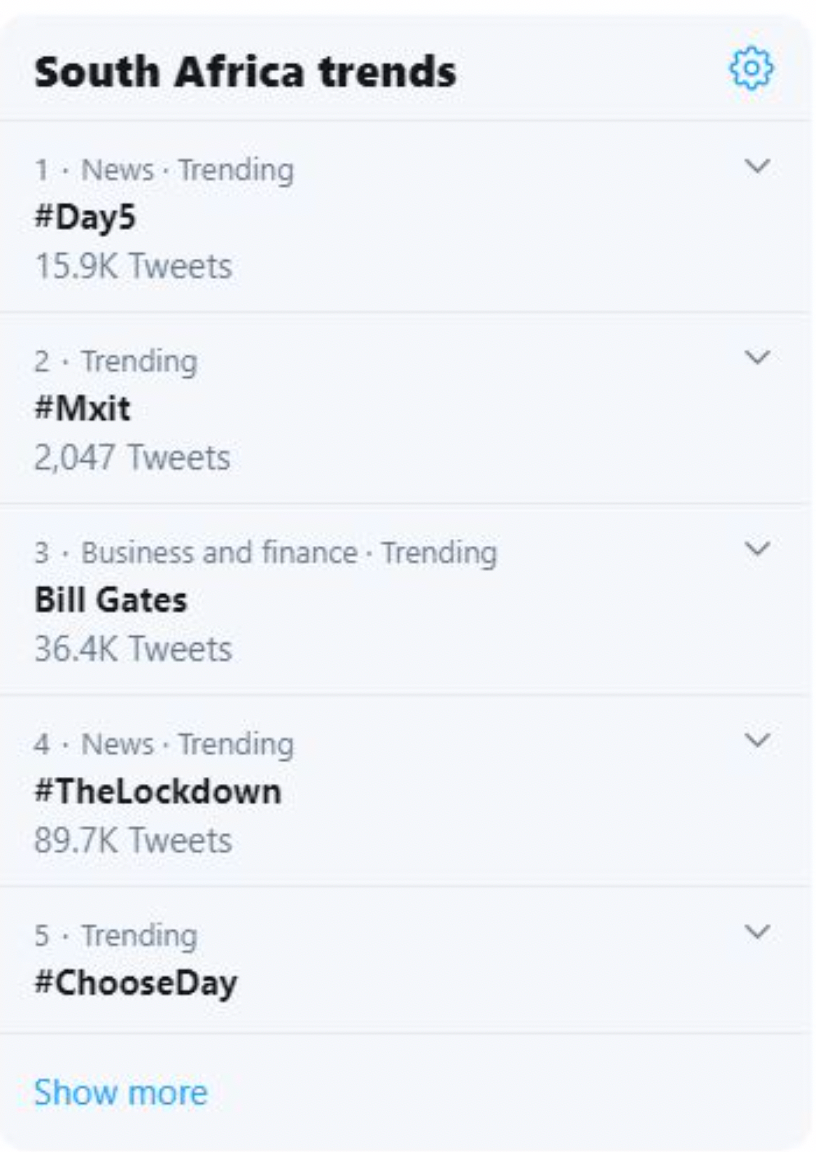
While the majority of the tweets by South African profiles appeared linked to the fake story claiming Bill Gates wanted to vaccinate African citizens against the virus, almost none of the accounts actually linked to the false stories published by EN24.com and other international websites. Instead, influential South African accounts primarily created their own original content about the conspiracy theory.
For example, the South African account @AdvoBarryRoux, with 850,000 followers, reached the largest number of Twitter users. In another tweet, the account referenced countries that need a COVID-19 vaccination more than Africa, similar to the original Facebook message claiming to be written by Raoult.

The tweets about Bill Gates were overwhelmingly negative, with many claiming the tech billionaire had a white savior complex and should not be allowed in Africa. Although the original message claiming to be by Raoult was not posted by influential accounts, the English translation was frequently posted in the comments section of tweets with high engagement, as evidence of the tweets’ claims.

Influential South African Twitter accounts also promoted other conspiracy theories: Izwe Lethu posted a clip of conspiracy theorist David Icke claiming that Bill Gates funds electronic vaccination tracking, while another account with almost 160,000 followers used the conversation about the Gates conspiracy theory to promote anti-vaxxer viewpoints.
Bill Gates is exonerated
On March 30, French-fact checking organization Check News debunked the story after contacting Méditerranée Infection, the university hospital institute where Raoult works. Méditerranée Infection stated that Raoult had not written the widely circulated message about Gates. However, the message remained on Facebook until April 1, when AFP also debunked the claim. As an independent fact-checking newsroom that partners with Facebook, AFP’s debunking of the statement led to all Facebook posts containing the inaccurate message being labeled as false information.

Tessa Knight is a Research Assistant, Southern Africa, with the Digital Forensic Research Lab.
Follow along for more in-depth analysis from our #DigitalSherlocks.
The Digital Forensic Research Lab team in southern Africa works in partnership with Code for Africa.



